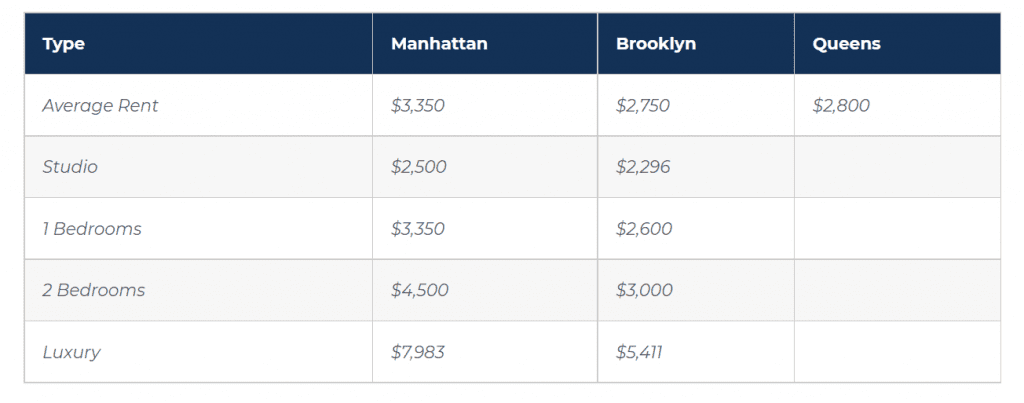Thousands of people from all over the country move their belongings to New York City with no plan. The Big Apple is stylish and as you know, if you can make it here, then you can survive anywhere.
So, if two people get here with the same account balance, without a job and no friends, how does one make out a comfortable life for themselves while the other don’t make it but rather hop on a bus and head back to the small town they had same from?
Well, one gets things right from the start while the other did not. You will in a perfect world have enough money saved in your pocket before embarking on a move so you can live on it for some months, but that doesn’t mean you can’t move on a very slim budget.
With the information provided below, you can plan your moving expenses to fall within your budget.
1. Carefully Look Into When To Move
Everyone is making effort to move during the summer months purposely because the weather is highly pleasant and school is not on. If possible, try to plan your moving time outside the moving season.
Most moving companies are not as busy in October and March, so you might have a good chance to negotiate a lower deal on your move. You can also better hunt for a home in these slow months because there are not many renters in the queue.
Rent, Size, Location: Prepare To Sacrifice Two
The deal is, unless you are fortunate to be among the few lucky ones who have enough amounts of money to spend on your relocation to one of the most costly cities in the country, you will have to forget about the idea of a perfect place. It may take you time to complete your apartment search.
According to a customer, “moving from a large 2-bedroom apartment forgetting a lake for an overall $518 per month ($295 per person), I was surprised when I discovered the most affordable, liveable 2-bedroom apartment will cost about $2,300 – $4,000 depending on averages gotten from Craigslist.”
2. Hire a Local Realtor
The apartment scene is highly expensive in New York, and if you don’t know much about the local housing market, you might want to get help from a vast expert.
While there are a handful apartment structures in the city, in some cases, renting in New York City implies spending the extra buck for a broker’s fee.
The unique broker’s fee starts from one month’s rent up to 15 percent of the yearly rental amount and you will pay it to the broker agent of the landlord. If you hire a realtor, they will handle all the legwork of getting you an apartment for a share of the broker’s fee you may have to pay anyway.
Average Rents in New York City


| Type | Manhattan | Brooklyn | Queens |
|---|---|---|---|
| Average Rent | $3,350 | $2,750 | $2,800 |
| Studio | $2,500 | $2,296 | |
| 1 Bedrooms | $3,350 | $2,600 | |
| 2 Bedrooms | $4,500 | $3,000 | |
| Luxury | $7,983 | $5,411 |
3. Find a Roommate
Normally, you should have a destination when you reach there. However, you may not feel the need to get an apartment until you are sure where you will be working.
Across the city, you will find a lot of people in need of a roommate or offering to rent a room. There are many websites for roommate matching on the internet. You may first look into Craigslist, but newcomers to New York City usually fall victims of scams from this website.
People understand that there is a regular increase if people looking to move here and use this to their selfish advantage. The use of a real rental site or service is often a safer way to determine a roommate you will quickly feel comfortable with.
4. Prepare to Pay
How fast you have to pay advance and the amount when you sign the lease is one of the poorest surprises of relocating to New York. If you have a place in mind, it is important to prepare a one-month upfront immediately, as in, that actual moment you are inside the apartment, especially during the high-demand season between May and September, when housing can be snatched from you in a blink of an eye.
There is sometimes no time to determine whether you like the place enough or not because there is already someone who knows and is making a deposit as you are still on the thinking stage, according to Ruth Shin, a licensed Realtor in Brooklyn.
Here are some typical pay models for an apartment:
- 1st Month Rent + Deposit + Application fee
- 1st Month Rent + Last Month Rent + Deposit + Application fee
- 1st Month Rent + Broker’s fee + Deposit + Application fee
- 1st Month Rent + Last Month Rent + Broker’s fee + Deposit + Application fee
Among the important things you need to note include if you don’t have credit (including foreigners) or have great bad credit, you may be required to pay 6 months to a year upfront during the signing of the lease. Sometimes, a landlord will only request an extra deposit.
5. Get Free Boxes
If you are on top of the process and have secured an apartment and booked interstate movers, you are likely feeling a hole in your budget already. There is no point in spending your money on moving boxes and supplies.
You can grab free boxes at bars, restaurants, and retail stores. Forget bubble wrap and consider towels t-shirts, linens, and other household items you are moving anyway.
6. Get a Tax Deduction
This is a double-benefit deal. Whether you are relocating on a local or long distance, the overall price of your move is based on how many items you are transporting.
By disposing of those piles of books you don’t read and out-of-style clothes you never put on now, you will reduce the total cost of your move. Also, you can send your unwanted things to a non-profit and take good tax deduction.
As regards tax deductions, you might want to look into the rules from the IRS to figure out whether the deductible applies to your moving expenses.
If you are moving to start another job or transfer to another office location, and your employer is not paying for it, you may be qualified for a tax deduction for your relocation expenses.
7. Dispose of 75% of your Items
NYC is not a city that has enough space to offer. So, when you are relocating, endeavor to dispose of all the things you can do without.
My roommate failed to follow this rule and came with a cough he was used to, now we have a couch placed in our kitchen.
If you are also the type that finds it hard leaving material things behind, then New York is probably not the city for you.
One great way to make extra money to offset your moving costs is to have a sale for your belongings.
8. Sell Your Stuff
Since you may likely be living with a roommate for a little and your first place will not be as spacious as where you are coming from, you then don’t have to keep that oversized sofa, 54-inch flat-screen, and king-size bed.
You don’t even need to keep them in storage as you may never even need them. Sell them all in advance so you can have more money for living in your new city. Once you get a place to live, visit IKEA in Brooklyn and cheaply furnish your new space.
9. Don’t Overlook The Outer Boroughs
While we all would love to reside in a penthouse looking over Central Park, living in Manhattan may not be a match for your budget. Due to the expensive rents in Manhattan, the outer boroughs which include Queens, Brooklyn, the Bronx, and Staten Island are becoming more famous, even for people who have their workplace in downtown Manhattan.
There are numerous great and developing neighborhoods you might want to consider in outer boroughs that have numerous restaurants and shopping but with more affordable real estate options.
Also, with the great public transportation in New York City, going to Manhattan is still fast.
10. Sell Your Car
NYC is not a city where you need a car. You might think you will surely drive it but it is just one other expense you will wish you hadn’t kept. Even if you do not have a vehicle payment, you will still pay for insurance and gas.
Also, parking is so much ridiculous here. The median cost for a garage space in NYC is $300 per month and this excludes parking fees anywhere you go. One of the most advanced transit systems in the world is found in this city.
If you want to be a New Yorker, you need to adapt to the subway. Look into Fresh Direct. Eating takeout daily will increase your expenses quickly, but it is not also fun carrying several bags on the subway.
Normally, you can fill your reusable shopping bag at the nearest grocer with what you can on daily basis and you will have all you need within a few days. Ordering is also possible from Fresh Direct.
This is an online grocer that will deliver for a token. You can have almost anything delivered to you in New York City.
11. Purchase Unlimited Metro Card
This should be the number one thing you do, purchasing a Metro Card. You won’t be able to afford to hail a cab every day unless you have an unlimited amount of money, and since your move is strictly on budget, you don’t. You can buy a 7-day or monthly unlimited pass; choose the monthly. You will be happy you did.
12. Use an Experienced New York City Mover
Between fighting with traffic and no parking zones and the move-in rules from your landlord, moving in Manhattan can leave you with so much pain.
While you might spend a little more than DIY when you hire a professional NYC moving company, you will save a lot of time, stress, and energy for yourself.
Most moving companies charge by the hour for moves inside the city, but Adams Van Lines long distance movers will provide you a cheap flat fee rate so you will know the actual cost for your move.
Final Words
Moving to New York is usually a dreadful and exciting time and one can easily get caught up in the worries of finding a neighborhood, finding a financial breakthrough, and earning your living in general.
Relax, and know that you are in or about to be in the greatest city in the universe. Benefit from the opportunities around you; some of your cherished memories will happen in the coming few months. Have a smooth moving experience!






